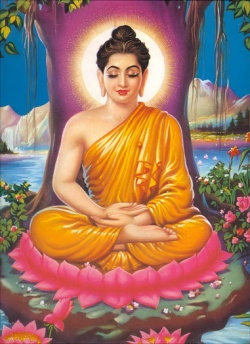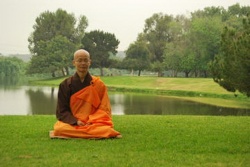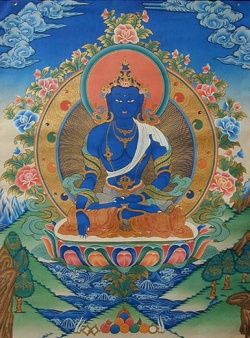Difference between revisions of "Nagarjuna & Evolutionary Skill: Bob Thurman Podcast"
(Created page with " March 18, 2015 Robert Thurman One of the main leaders of the enlightenment {{Wiki|movement}} in India was a great monk-teacher called Nagarjuna, who li...") |
|||
| (One intermediate revision by the same user not shown) | |||
| Line 1: | Line 1: | ||
| + | <nomobile>{{DisplayImages|2326|1280|1951|1865|3073}}</nomobile> | ||
| + | March 18, 2015 [[Robert Thurman]] | ||
| + | |||
| + | |||
| + | One of the main leaders of the [[enlightenment]] {{Wiki|movement}} in [[India]] was a great monk-teacher called [[Nagarjuna]], who lived sometime between the first century B.C.E. and the second century C.E. By this time, | ||
| + | |||
| + | [[India]] had developed enormously, with large numbers of [[enlightened]] {{Wiki|individuals}} working to [[transform]] the whole [[society]] gradually. | ||
| + | |||
| + | [[Nagarjuna]] became a [[monk]] as a young child, and later became a famous [[monastic]] [[teacher]], a {{Wiki|medical}} doctor, and an {{Wiki|alchemist}}. | ||
| + | |||
| + | Legend also casts [[Nagarjuna]] in a unique role as rediscoverer of the teachings of the [[universal vehicle]] itself, said to have been lost to [[humanity]] since the [[Buddha’s]] time. | ||
| − | |||
| − | + | [[Myth]] has it that one day, [[Nagarjuna]] [[recognized]] two [[dragons]] posing as [[humans]] at the back of his lecture hall. | |
| + | |||
| + | After the class, he called them over and asked why they had come to see him. | ||
| + | |||
| + | They invited him down to their [[realm]] at the bottom of the [[Indian Ocean]] to visit the [[dragon]] king’s palace. | ||
| + | |||
| + | There [[the dragon king’s daughter]] showed him a [[treasure]] room, where the [[scriptures]] recording the [[Buddha’s]] universal-liberation teachings were stored in rich profusion. | ||
| + | |||
| + | After fifty years of [[earth]] time studying these teachings, [[Nagarjuna]] brought them out of the sea’s depths and returned with them to [[India]]. | ||
| + | |||
| − | |||
[[Nagarjuna]] & [[King]] [[Udayi]]: The [[Scholar]] & [[Ruler]] | [[Nagarjuna]] & [[King]] [[Udayi]]: The [[Scholar]] & [[Ruler]] | ||
| − | |||
| − | |||
| − | He [[taught]] his [[friend]] the [[king]] how to care for every being in his {{Wiki|kingdom}}: by building schools everywhere and endowing honest, kind, and brilliant [[teachers]]; by providing for all his [[subjects]]’ needs, opening free restaurants and inns for travelers; by tempering justice with [[mercy]], sending barbers, [[doctors]], and [[teachers]] to the prisons to serve the inmates; by [[thinking]] of each prisoner as his [[own]] wayward child, to be corrected in order to return to free [[society]] and use his or her [[precious human life]] to [[attain enlightenment]]. Following [[Nagarjuna’s]] advice, [[King]] [[Udayi]] was able to implement the {{Wiki|principles}} of [[enlightened]] {{Wiki|politics}} in his {{Wiki|kingdom}} more completely, in fact, than [[Ashoka]] had because of this introduction of [[universal]] {{Wiki|responsibility | + | [[Nagarjuna]] used his position as a famed and respected [[teacher]] of [[monastic]] [[Buddhism]] to spread these teachings widely. He eventually became the {{Wiki|mentor}} of a great [[king]] of a {{Wiki|dynasty}} in southern [[India]], [[King]] [[Udayi Shatavahana]], who ruled the area of the [[Deccan]] highland running from contemporary {{Wiki|Bombay}} to [[Andhra Pradesh]] (ca. 150 –200 C.E.). |
| + | |||
| + | Though the {{Wiki|archaeological}}, artistic, and {{Wiki|literary}} {{Wiki|evidence}} of the king’s {{Wiki|rule}} is only fragmentary, the advice that [[Nagarjuna]] gave to [[King]] [[Udayi]] has come down to us in [[Nagarjuna’s]] famous text the [[Jewel Garland of Royal Counsel]], which was probably written around mid–second century C.E. | ||
| + | |||
| + | |||
| + | [[Nagarjuna]] instructed the [[king]] first in what he needed to know for his [[own]] [[liberation]] and [[development]], in line with [[Ashoka’s]] first [[principle]] of [[enlightened]] {{Wiki|politics}}, the [[transcendent]] value of the {{Wiki|individual}}. | ||
| + | |||
| + | [[Nagarjuna]] then advised [[King]] [[Udayi]] on the basic [[principle]] of [[enlightened]] {{Wiki|social}} [[action]], the [[universal]] [[altruism]] of great [[love]] and great {{Wiki|empathy}}: | ||
| + | |||
| + | “O [[King]]! Just as you [[love]] to consider what to do to help yourself, so should you [[love]] to consider what to do to help others!” | ||
| + | |||
| + | |||
| + | He [[taught]] his [[friend]] the [[king]] how to care for every being in his {{Wiki|kingdom}}: by building schools everywhere and endowing honest, kind, and brilliant [[teachers]]; | ||
| + | |||
| + | by providing for all his [[subjects]]’ needs, opening free restaurants and inns for travelers; by tempering justice with [[mercy]], sending barbers, [[doctors]], and [[teachers]] to the prisons to serve the inmates; by [[thinking]] of each prisoner as his [[own]] wayward child, | ||
| + | |||
| + | to be corrected in order to return to free [[society]] and use his or her [[precious human life]] to [[attain enlightenment]]. | ||
| + | |||
| + | Following [[Nagarjuna’s]] advice, [[King]] [[Udayi]] was able to implement the {{Wiki|principles}} of [[enlightened]] {{Wiki|politics}} in his {{Wiki|kingdom}} more completely, in fact, than [[Ashoka]] had because of this introduction of [[universal]] {{Wiki|responsibility | ||
| + | |||
| + | |||
The Politics of [[Enlightenment]]: [[Sacred]] [[Duty]] | The Politics of [[Enlightenment]]: [[Sacred]] [[Duty]] | ||
| − | In addition, [[Nagarjuna]] said that if a [[ruler]] cannot implement a {{Wiki|politics}} of [[enlightenment]], then that [[ruler]] must abandon the [[throne]] to pursue [[enlightenment]] first. This counsel contradicts all other systems of {{Wiki|political}} [[wisdom]], which posit the [[ruler]] and the ruler’s work as the most important. The “[[sacred]] [[duty]]” of the [[king]], the “supreme {{Wiki|responsibility}}” of the [[president]] —so much that supports the insufferable pompousness of rulers derives from the [[idea]] that the will and the need of the collective are supreme over the will and need of the {{Wiki|individual}}. | + | |
| + | In addition, [[Nagarjuna]] said that if a [[ruler]] cannot implement a {{Wiki|politics}} of [[enlightenment]], then that [[ruler]] must abandon the [[throne]] to pursue [[enlightenment]] first. | ||
| + | |||
| + | This counsel contradicts all other systems of {{Wiki|political}} [[wisdom]], which posit the [[ruler]] and the ruler’s work as the most important. | ||
| + | |||
| + | The “[[sacred]] [[duty]]” of the [[king]], the “supreme {{Wiki|responsibility}}” of the [[president]] —so much that supports the insufferable pompousness of rulers derives from the [[idea]] that the will and the need of the collective are supreme over the will and need of the {{Wiki|individual}}. | ||
| + | |||
[[Nagarjuna]] with 84 [[Mahasiddha]] | [[Nagarjuna]] with 84 [[Mahasiddha]] | ||
| − | |||
| − | The {{Wiki|practical}} impact of this advice is that the immediate needs of the collective are just not that important. The collective [[interest]] is no more than the sum of the {{Wiki|individual}} interests. No {{Wiki|matter}} how much territory a [[society]] acquires, how much glory or [[wealth]], each {{Wiki|individual}} within it still will sicken , age, and [[die]]. The collective cannot help that {{Wiki|individual}} beyond [[death]]. Only by our [[understanding]] the lack of fixed [[Wikipedia:Identity (social science)|identity]] and reaching [[mastery]] of our reactions through [[meditation]] can we help our situation. It is the job of [[society]] to provide the {{Wiki|individual}} with the opportunity to cultivate these {{Wiki|abilities}}. More than two-thirds of the [[Jewel Garland]] contains personal instructions on [[realizing]] the core [[insight]] of {{Wiki|individualism}}, the freedom from a rigid, [[unchanging]] [[self]]. | + | The prime self-sacrificer is said to be the [[ruler]] himself or herself—“Heavy lies the head that wears the {{Wiki|crown}}.” |
| + | |||
| + | The [[king]] must put the collective ahead of himself, submerge his {{Wiki|individual}} [[interest]] in the collective [[interest]], and in so doing confirm that all {{Wiki|individuals}} in the [[society]] {{Wiki|matter}} less than the collective will. | ||
| + | |||
| + | This is the [[essence]] of the totalitarian [[state]], whether fascist, [[communist]], or imperialist. {{Wiki|Individual}} fulfillment is suppressed in the [[name]] of the [[liberation]] of all the [[people]], but the bottom line is that not a single one gets {{Wiki|liberated}}. | ||
| + | |||
| + | There is no way to {{Wiki|liberate}} [[people]] other than one by living one, and, according to [[Nagarjuna’s]] advice, starting with the [[king]] himself. | ||
| + | |||
| + | |||
| + | |||
| + | The {{Wiki|practical}} impact of this advice is that the immediate needs of the collective are just not that important. The collective [[interest]] is no more than the sum of the {{Wiki|individual}} interests. | ||
| + | |||
| + | No {{Wiki|matter}} how much territory a [[society]] acquires, how much glory or [[wealth]], each {{Wiki|individual}} within it still will sicken , age, and [[die]]. | ||
| + | |||
| + | The collective cannot help that {{Wiki|individual}} beyond [[death]]. Only by our [[understanding]] the lack of fixed [[Wikipedia:Identity (social science)|identity]] and reaching [[mastery]] of our reactions through [[meditation]] can we help our situation. | ||
| + | |||
| + | It is the job of [[society]] to provide the {{Wiki|individual}} with the opportunity to cultivate these {{Wiki|abilities}}. | ||
| + | |||
| + | More than two-thirds of the [[Jewel Garland]] contains personal instructions on [[realizing]] the core [[insight]] of {{Wiki|individualism}}, the freedom from a rigid, [[unchanging]] [[self]]. | ||
By combining the [[insight]] into the [[nature]] of [[self]] with [[universal]] {{Wiki|responsibility}}, [[Nagarjuna]] added a new [[dimension]] not only to the [[evolution]] of [[Buddhism]] but to the unfolding of [[Indian]] [[society]] itself. | By combining the [[insight]] into the [[nature]] of [[self]] with [[universal]] {{Wiki|responsibility}}, [[Nagarjuna]] added a new [[dimension]] not only to the [[evolution]] of [[Buddhism]] but to the unfolding of [[Indian]] [[society]] itself. | ||
Latest revision as of 16:19, 17 November 2015
March 18, 2015 Robert Thurman
One of the main leaders of the enlightenment movement in India was a great monk-teacher called Nagarjuna, who lived sometime between the first century B.C.E. and the second century C.E. By this time,
India had developed enormously, with large numbers of enlightened individuals working to transform the whole society gradually.
Nagarjuna became a monk as a young child, and later became a famous monastic teacher, a medical doctor, and an alchemist.
Legend also casts Nagarjuna in a unique role as rediscoverer of the teachings of the universal vehicle itself, said to have been lost to humanity since the Buddha’s time.
Myth has it that one day, Nagarjuna recognized two dragons posing as humans at the back of his lecture hall.
After the class, he called them over and asked why they had come to see him.
They invited him down to their realm at the bottom of the Indian Ocean to visit the dragon king’s palace.
There the dragon king’s daughter showed him a treasure room, where the scriptures recording the Buddha’s universal-liberation teachings were stored in rich profusion.
After fifty years of earth time studying these teachings, Nagarjuna brought them out of the sea’s depths and returned with them to India.
Nagarjuna & King Udayi: The Scholar & Ruler
Nagarjuna used his position as a famed and respected teacher of monastic Buddhism to spread these teachings widely. He eventually became the mentor of a great king of a dynasty in southern India, King Udayi Shatavahana, who ruled the area of the Deccan highland running from contemporary Bombay to Andhra Pradesh (ca. 150 –200 C.E.).
Though the archaeological, artistic, and literary evidence of the king’s rule is only fragmentary, the advice that Nagarjuna gave to King Udayi has come down to us in Nagarjuna’s famous text the Jewel Garland of Royal Counsel, which was probably written around mid–second century C.E.
Nagarjuna instructed the king first in what he needed to know for his own liberation and development, in line with Ashoka’s first principle of enlightened politics, the transcendent value of the individual.
Nagarjuna then advised King Udayi on the basic principle of enlightened social action, the universal altruism of great love and great empathy:
“O King! Just as you love to consider what to do to help yourself, so should you love to consider what to do to help others!”
He taught his friend the king how to care for every being in his kingdom: by building schools everywhere and endowing honest, kind, and brilliant teachers;
by providing for all his subjects’ needs, opening free restaurants and inns for travelers; by tempering justice with mercy, sending barbers, doctors, and teachers to the prisons to serve the inmates; by thinking of each prisoner as his own wayward child,
to be corrected in order to return to free society and use his or her precious human life to attain enlightenment.
Following Nagarjuna’s advice, King Udayi was able to implement the principles of enlightened politics in his kingdom more completely, in fact, than Ashoka had because of this introduction of universal {{Wiki|responsibility
The Politics of Enlightenment: Sacred Duty
In addition, Nagarjuna said that if a ruler cannot implement a politics of enlightenment, then that ruler must abandon the throne to pursue enlightenment first.
This counsel contradicts all other systems of political wisdom, which posit the ruler and the ruler’s work as the most important.
The “sacred duty” of the king, the “supreme responsibility” of the president —so much that supports the insufferable pompousness of rulers derives from the idea that the will and the need of the collective are supreme over the will and need of the individual.
Nagarjuna with 84 Mahasiddha
The prime self-sacrificer is said to be the ruler himself or herself—“Heavy lies the head that wears the crown.”
The king must put the collective ahead of himself, submerge his individual interest in the collective interest, and in so doing confirm that all individuals in the society matter less than the collective will.
This is the essence of the totalitarian state, whether fascist, communist, or imperialist. Individual fulfillment is suppressed in the name of the liberation of all the people, but the bottom line is that not a single one gets liberated.
There is no way to liberate people other than one by living one, and, according to Nagarjuna’s advice, starting with the king himself.
The practical impact of this advice is that the immediate needs of the collective are just not that important. The collective interest is no more than the sum of the individual interests.
No matter how much territory a society acquires, how much glory or wealth, each individual within it still will sicken , age, and die.
The collective cannot help that individual beyond death. Only by our understanding the lack of fixed identity and reaching mastery of our reactions through meditation can we help our situation.
It is the job of society to provide the individual with the opportunity to cultivate these abilities.
More than two-thirds of the Jewel Garland contains personal instructions on realizing the core insight of individualism, the freedom from a rigid, unchanging self.
By combining the insight into the nature of self with universal responsibility, Nagarjuna added a new dimension not only to the evolution of Buddhism but to the unfolding of Indian society itself.
Source
http://bobthurman.com/nagarjuna-evolutionary-skill-bob-thurman-podcast/




